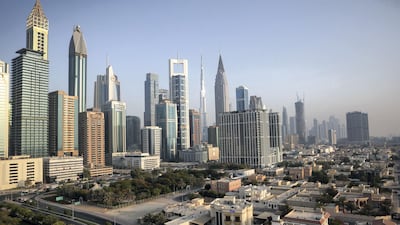Office rents in Dubai began to stabilise during the second quarter of this year with the technology, media and telecoms, or TMT, sector driving demand, according to a new report from property consultancy Knight Frank.
The move comes as the UAE economy recovers from the effects of the coronavirus pandemic on the back of new initiatives from the government.
Fourteen of the 26 submarkets tracked by the consultancy registered no quarterly change while rents rose in a number of areas such as Business Bay, Downtown Jebel Ali, Dubai Hills, Dubai Media City and The Greens.
“As is the case with other global cities, the TMT sector is underpinning office requirements as the market thaws following an extended period of pandemic-induced stasis and it is the TMT sector where we are seeing the fastest rate of job creation,” the report said.
However, overall office rents remain at nine-year lows, leaving occupiers firmly in the driving seat, the report's findings show.
The new requirements for office space during the second quarter rose by 11.2 per cent to 18,859.3 square metres, from 16,954.8 square metres in the previous quarter.
Office rents in Downtown Jebel Ali increased by 8.3 per cent from the previous quarter to Dh65 ($17.69) a square foot while Business Bay rents rose by 4.4 per cent to Dh78 a square foot.
Rents in The Greens were up 6.1 per cent to Dh88 a square foot. On an annual basis, rents in the Business Bay and The Greens districts increased by 4 per cent and 6 per cent, respectively, during the quarter.
The TMT and transport and storage sectors are expected to add about 100,000 new jobs to the UAE economy over the next five years, driving demand for office space, according to the consultancy.
“Of the 203,000 square feet of new requirements registered during the second quarter, the technology, media and telecoms sector accounts for the lion’s share [22.1 per cent], followed by design and architecture firms [19.2 per cent] and the hospitality sector [9.9 per cent],” the report said.
Most TMT requirements are concentrated around the emirate's city centre in areas such as the Dubai International Financial Centre, Downtown Dubai, Sheikh Zayed Road and Business Bay districts, according to Knight Frank. The DIFC continues to attract new technology start-ups.
The 100 per cent company foreign ownership law that came into effect on June 1 will “undoubtedly have a significant impact in the medium to long term for demand for office space in key markets such as Dubai and Abu Dhabi that are still slowly recovering in the aftermath of the global pandemic”, the report said.
Last year, the UAE overhauled its commercial company laws, annulling the need for an Emirati shareholder for onshore companies and opening up a number of sectors to foreign investors. The move was aimed at boosting the country’s competitive advantage and attracting foreign capital to the Arab world’s second-largest economy.
However, the consultancy does not expect the changes to commercial company ownership laws to spark the sudden exit of businesses from the city’s free zones.
“The amended law is largely designed to benefit the manufacturing sector and most free zone locations offer numerous advantages over onshore locations, access to world class transport and logistics infrastructure, agglomeration benefits and free zone-specific tax advantages, for instance,” it said.
The UAE's economy is expected to grow by 2.4 per cent in 2021, according to the UAE Central Bank, as the country gradually recovers from the coronavirus-induced headwinds.
Meanwhile, challenges remain as demand for sustainable buildings grows, according to Knight Frank.
“The big challenge, as we see it, will be on how landlords and businesses will attract workers back to their desks in a meaningful way. We know the green agenda will be core to this and it is likely to influence the real estate decisions of nine out 12 businesses in the future,” said Faisal Durrani, partner and head of Middle East Research at Knight Frank.
“As Dubai’s prime office stock in core location ages, the calls to refurbish and greenify will grow louder, or such assets could potentially face rising voids and potential obsolescence.”


